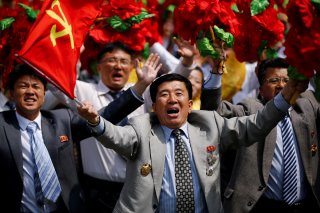North Korea Offers Talks to South Korea: What Happens Next?
Dreams of an inter-Korean team, and a thaw in relations, burn bright in Seoul.
On the first working day of 2018, hopeful South Korean officials scrambled to respond to the olive branch extended yesterday by Kim Jong-un. In his customary New Year’s address, the North Korean leader said he wanted North and South to “immediately” meet.
At a press conference on Tuesday afternoon, Minister of Unification Cho Myoung-gyon proposed a high-level meeting with North Korean officials at the truce village of Panmunjeom in the De-Militarized Zone on Jan 9.
It was not clear who be involved the delegation, but a ministry official clarified after the press briefing: “I would presume ministerial level.” The agenda remains open, but it looks set to focus on the issue of North Korean participation in the Pyeongchang Winter Olympics, the official added. The Games are set to take place in South Korea between Feb 9–25.
In his customary New Year’s broadcast, Kim said he was “open to dialogue” with the South and was ready to discuss participation in Pyeongchang. In fact, only two North Korean skaters have qualified for the Games, and did not register to compete by the October deadline.
Recommended: North Korea Has 200,000 Soldiers in Its Special Forces
Recommended: Why Doesn't America Kill Kim Jong Un?
Recommended: 1.2 Million Casualties: If North Korea Attacked Los Angeles with a Nuclear Weapon
Still, Seoul responded with alacrity to Kim’s speech. The South Korean presidential office responded within hours, saying that Seoul was ready to talk “any time, any place, in any format.”
And at a cabinet meeting earlier on Tuesday, South Korean President Moon Jae-in urged his unification and sports ministers to take steps to include North Koreans in Pyeongchang.
Kim’s New Year’s address was a gift to the South Korean president. The liberal Moon has been consistently clear that he wants to engage with Pyongyang, and has said that a North Korean presence at the 2018 Winter Olympics could be a first step toward improved inter-Korean relations. Last June, he called for a joint inter-Korean team.
However, Moon’s requests for dialog have been ignored and rebuffed as Kim expended his rhetorical ammunition on his war of words with the United States President Donald Trump.
The only significant inter-Korean contact of Moon’s administration took place in June, during the 2017 World Taekwondo Championships in Muju, South Korea, which was attended by a North Korean delegation.
In Muju, Moon suggested fielding an inter-Korean team for Pyeongchang. But a promised return invitation for South Koreans to attend a taekwondo championship in Pyongyang, North Korea, in September, was never received as relations deteriorated and contacts dried up.
While experts were cautiously positive on the new year developments, they warned that South Korea should not get starry-eyed over Kim’s suddenly conciliatory approach toward Seoul.
“Domestically this may be good news, as Moon Jae-in has been hoping for this and North Korea has responded to the call for dialog, but I don’t know if this dialog can be expanded to the nuclear issue,” said Dr. Kang Choi, vice-president of Seoul’s Asan Institute, a think tank.
“I think that Kim has been trying to be recognized by the US as a nuclear state, but that has been a failure, so now he has chosen South Korea as a gateway to the US.”
Some pundits believe that Pyongyang’s nuclear arms program is not intended merely to deter an attack, but is an offensive tool to leverage Seoul and Washington apart.
Moon recently suggested that South Korean-US military exercises could be suspended in the run-up to the Pyeongchang Games – a suspension that could dull the currently high tensions on the peninsula. The suggestion has met with a lukewarm response in Washington, and Trump himself has only said, “we’ll see” in reponse to Kim’s speech.
Seoul should be “both cautious and confident” in the mooted dialog, said Daniel Pinkston, a strategy expert at Troy University, as Pyongyang’s “nationalistic appeals and united-front tactics can get traction in portions of South Korean society.”
“In the short term, a big win for North Korea would be ending or scaling back the combined and multi-national military exercises in the South this spring,” Pinkston added. “And even if that does not happen, they will work on creating social pressure from sympathetic groups in the South.”
Moon’s hopes for Winter Olympic diplomacy appear high – perhaps reflecting the success of US President Richard Nixon and Chinese leader Deng Xiaoping’s in “ping-pong diplomacy” with which led to improved ties between China and the United States.
And there is a history of inter-Korean sports diplomacy. In 1991, the two Koreas fielded joint table tennis and junior football teams, and at the 2000 and 2004 summer Olympics, marched on together, but completed separately. A high-ranking North Korean delegation also visited the 2014 Asian Games in South Korea.
However, none of these promising opportunities led to any long-term impact on the troubled relations that continue to roil the divided peninsula.

